Sun 16 May 2010
A Movie Review by David L. Vineyard: LEAVE HER TO HEAVEN (1945).
Posted by Steve under Films: Drama/Romance , Reviews[12] Comments
LEAVE HER TO HEAVEN. 20th Century-Fox, 1945. Gene Tierney, Cornell Wilde, Jeanne Crain, Vincent Price, Darryl Hickman, Mary Phillips, Ray Collins, Chill Wills, Gene Lockhart. Screenplay by Jo Swerling, based on the novel by Ben Ames Williams. Cinematography: Leon Shamoy. Director: John M. Stahl.
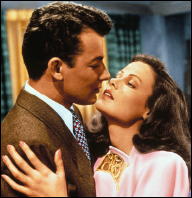
I don’t think I have ever heard anyone argue that this stunning Technicolor film — photographed in the glossiest and brightest light imaginable, with sets in New Mexico, Georgia, and Maine that look as if they were straight from the pages of House Beautiful and Architectural Digest — is anything but the darkest of film noir classics.
That’s thanks to a stunning performance by Gene Tierney as a beautiful and soulless sociopath who doesn’t care to share her love — and will go to any length to keep her loved ones to herself — including murder.
Tierney got an Oscar nomination and Leon Shamoy’s cinematography won the statuette for this mix of gothic and soap opera elements with one of the screen’s most beautiful monsters at its heart. ( The title comes from Hamlet, the ghost of Hamlet’s father pleading with his son not to pursue vengeance against his Mother, but rather “leave her to heaven …”)
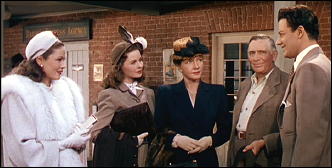
Richard (Cornell Wilde) is a talented artist and writer visiting in New Mexico (and it never looked better) where he meets Ellen (Tierney) who is there to scatter the ashes of her recently dead father. She is the spoiled daughter of her much loved medical researcher father and Mary Phillips, and sister of the adopted Ruth (Jeanne Crain), and brings Richard back to Maine to meet her family.
Richard soon finds himself in Ellen’s determined sights, and it is a delight to be stalked by her, but there are small undercurrents. Ellen’s devotion to her late father is extreme — to the extent her mother adopted Ruth rather than be cut out and alone in the family. Then she breaks up with fiancee Vincent Price in a cold manner so she can have Richard, leaving Price bitter and angry.
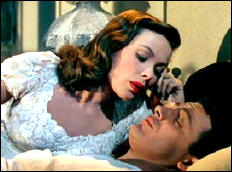
Watching Ellen race her sister across the pool family friend and lawyer Ray Collins observes: “Ellen always wins.” What he doesn’t add is at any price.
But Richard and Ellen marry and seem extremely happy. He brings her back to Warm Springs Georgia with him where he lives with his brother Danny (Darryl Hickman) who has polio. Ellen befriends him and begins to help him recover in the hospital, talking about how he can attend boarding school when he is well, and meanwhile at home she wants no servants around — just she and Richard — maybe a child — in time — a long time.
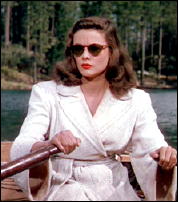
But Ellen’s plans backfire. When she gets Danny well enough to walk he comes with them to Richard’s writing retreat — and even worse the handyman Chill Wills, a friend from Richard’s childhood, makes them a foursome. So something must be done, and since Danny swims every day to strengthen his polio-crippled legs …
The scene where Ellen watches as Danny drowns is one of the finest moments of noir on film, a cold-blooded murder seldom equaled for impact on screen, and done in the brightest of sunshine and the most gorgeous of Technicolor. If ever a film demonstrated noir is a mind set more than a look, it is this one.
But like all Ellen’s plans, this one too backfires. Her family comes to cheer Richard up, with him depressed and lost since Danny’s death — and worst he is withdrawing from Ellen. So Ellen determines to get pregnant to cheer him up — but he loves the coming child too much and grows too close to Ruth. And Ellen can’t face that. She confesses to Ellen she hates the child inside of her.
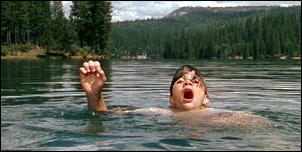
Ruth: “No, you’re the one who’s afraid.”
Ellen causes herself to lose the child, but by now Richard has begun to see what she is: “He loves me,” she tells Ruth, “but he never liked me.” Eventually he confronts her and she admits she killed Danny and their child — though not quite how fully she was involved. Richard leaves her.
You don’t leave Ellen. She poisons herself and frames her sister for her death, carefully concocting her revenge and framing her sister Ruth. She even asks to be cremated so it will contradict her will that asks to be buried next to her father.
And the frame takes. The vengeful Price first blames her sister Ruth, as Ellen intended, trying her for murder and putting Richard as much on trial as Ruth.
Richard sacrifices himself to save Ruth, he confesses that he knew Ellen murdered Danny, and the vengeful Price sees he serves two years for withholding evidence of a crime, but he returns home to Crain’s arms.
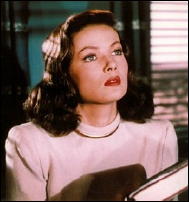
Granted there are some huge holes in logic here. Vincent Price would never have been allowed to prosecute a case he was so close to and Richard could not be charged as an accessory after the fact since he could not testify against Ellen anyway, not to mention Ruth would not have to testify if charged with murder.
But never mind the lapses of logic, this, like much film noir and even many horror films, is a nightmare with its own internal logic. Accept it at that level and it ill hold you with Ellen the most fatale femme of them all.
This film is film noir because of Tierney’s Ellen and only because of Tierney’s Ellen, but in this case that is more than enough.
Ben Ames Williams was a best selling novelist whose work crossed over into numerous genres from historical fiction (All The Brothers Were Valiant) to mystery and suspense. He isn’t read much today, but that isn’t to say he shouldn’t be.
Leave Her to Heaven is a fine example of Hollywood virtues, a product of studio skills and values at their best. Remade for television in 1988 as Too Good To Be True, this may be the darkest foray into bright sunshine you ever experience, a Technicolor nightmare bright and shiny as a polished stone and at its heart as cold and empty.
Gene Tierney was never lovelier on film — and never more monstrous. I don’t know about Dracula and Frankenstein, but Ellen scares me.
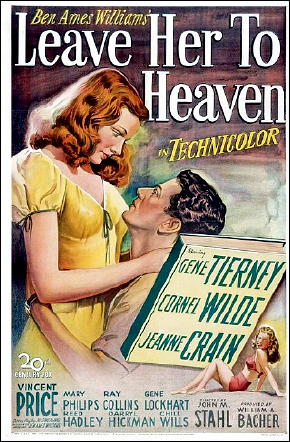
May 17th, 2010 at 1:13 am
I mentioned some lapses in logic in this one, and looking over the review I stumbled over a big one, but I’ll have to watch the film again to be sure I understood it right. Early in the film there is a famous scene where Ellen scatters her father’s ashes from horseback in the beautifully shot Technicolor New Mexico high desert.
Later in the film when she has poisoned herself she tells Richard she wants to be cremated as part of her plot to frame Ruth because her will clearly says she wants to be buried in the family vault with her father … leaving the impression for Vincent Price and the jury that Ruth and Richard had her cremated to cover up the fact she was poisoned. As I said, I’ll have to watch again to see if I missed something, misunderstood, or if it’s as big a gaffe as it seems. Quite a bit is made of it at the trial.
But then the whole trial is one of those Hollywood affairs that would never happen in real life — at least not in that manner.
Still, it’s not likely to bother you while watching the film anymore than the legal questions should bother you or the fact that the way Ellen disposes of her father’s ashes would have covered her and her horse in them.
I should also mention Ellen’s family is with her in New Mexico when she meets Richard as is her beau Vincent Price and lawyer/family friend Ray Collins. But that can be forgiven since the same car that picks them up in New Mexico later picks them up in Warm Springs, Georgia. Frankly after a while one gorgeous body of water starts to look like another save for the ocean scenes.
And in case anyone didn’t know Warm Springs was where FDR was treated for his polio and it became a famous treatment center for others with the disease like Danny in the film.
May 17th, 2010 at 2:26 am
David
I’ve not seen the film in years, and at the time any lapses in logic would have passed over right over my head — I mean years ago.
I’m sure it was on a black and white TV. I sure don’t remember seeing it in color, and back then there certainly wasn’t any way to back up the video or DVD and take another look at certain scenes again to see what you missed.
In any case, and I’m not sure that it pertains to the point you’re making, but didn’t Ellen have to convince her mother to cremate her father, or did she only convince her to let her scatter the ashes? But maybe there was a tomb at one time in which her father was to be buried.
Or am I just misremembering everything altogether?
I _am_ going to have to watch the movie again, that’s for sure.
Here’s a question. Is this the first movie generally considered to be noir to have been shown in color? DESERT FURY was in color, and it might have been the one I’d have thought of first, but it didn’t come along until 1947.
Steve
May 17th, 2010 at 3:46 am
I can’t think of another Technicolor film from the era you could call noir by any stretch of the imagination other than DESERT FURY. If there is one I’d be interested to know what it is.
Silver and Ward incidentally do not list DESERT FURY as noir in their book, although they mention it in relation to Robert Rossen’s films. The first color film they list after LEAVE HER TO HEAVEN is 1953’s NIAGARA (I disagree and consider DESERT FURY noir by any measure).
Leon Shamoy uses hues of orange and deep blues much the way John Alton uses stark blacks and grays to establish an oppressive mood despite the beauty of scenery and settings.
By the end of the fifties Technicolor noir was pretty common, but some purists don’t allow for some of them though it is hard to call a film like INFERNO, VIOLENT SATURDAY, or THE EDGE OF ETERNITY anything but noir. By 1956 Technicolor noir was fairly common though.
I do think Ellen may have demanded (she would never argue) that she scatter her father’s ashes, and I’m sure the family vault is established, but I think at the trial Price claims her will states she be buried in the family vault ‘with’ her father. Of course it could be pointed out the will was just never changed, but it is a point Price’s prosecutor makes forcefully (incidentally it is a small but good performance by a very young looking Price). I haven’t read the book for twenty years so it is possible Williams deals with some of these issues the film just doesn’t have time for. Sometimes the connecting tissue gets left on the cutting room floor if it is filmed at all.
On the point of Richard’s innocence of the crime he serves two years for, not only could he not be forced to testify against his wife, but since his knowledge of the crime is hearsay it couldn’t have been used in court anyway. The worst he could be prosecuted for is perjury — and even that would be a hard charge to prove. Still, it wouldn’t be the first time in noir or reality a vengeful prosecutor railroaded someone into the pen.
Not that any of this effects the film which turns on Tierney’s performance. Ellen is a monster, but like the heroine in the novel TO WALK THE NIGHT by William Sloane she is so alien, almost a figure of Greek tragedy, that she is almost above judgment. Inhumanly beautiful and inhumanly self contained.
She’s a mythic figure, and the quote the title is taken from strengthens that sense of inhumanity — ‘leave her to heaven …’ because she is above human judgment and human law and it is only tragic that mere humans fall within her orbit. Like the fickle and deadly gods of ancient Greece she destroys those humans who are touched by her not because she is cruel or evil but simply because she burns with a fire mere flesh cannot withstand.
I don’t know about anyone else, and I certainly grant the noir credentials of Lizbeth Scott, Gloria Grahame, Barbara Stanwyck, Joan Crawford, and Jane Greer, but Tierney’s Ellen is far more destructive than their simple human evil. She isn’t a monster in the usual sense, but in the sense that she is beyond understanding — even calling her a sociopath (as I do) is psychobabble — her Ellen is simply ‘other.’
The funny thing about this film is that it may be the most disturbing noir film ever made simply because the only thing anyone in the film is guilty of is being naive enough to fail to think that such grace and beauty as Ellen represents could be as destructive as it is. Even Ruth and her mother who know she is a monster seem unable to admit what she is until it is almost too late. Loving or being loved by her is like staring at the Sun — blinding.
May 17th, 2010 at 5:20 am
Another color film noir is SLIGHTLY SCARLET starring John Payne(1956), with John Alton as photographer. Based on James Cain’s LOVE’S LOVELY COUNTERFEIT.
May 17th, 2010 at 5:55 am
SLIGHTLY SCARLET is a good one, and I thought Alton used color almost as well as he did black and white.
It’s also the first color film after NIAGARA Silver and Ward credit as noir — they don’t allow for another until 1958’s PARTY GIRL, though I think there are several films that fit the category including the ones I mentioned above. But then they don’t allow for REAR WINDOW or VERTIGO either which I found a bit strange.
May 17th, 2010 at 5:09 pm
This film was aired on our PBS station lst Saturday and you all make me regret not watching it. Maybe it will come by again.
May 17th, 2010 at 10:36 pm
Randy
Actually I watched it on my local PBS Saturday — as far as I know they all show the same film but with local hosts. I don’t know about your station, but the local station repeats the Saturday film late Friday — maybe your station will too.
It’s worth seeing, though you may at first be surprised it is noir — it’s not until Darryl Hickman’s death that you realize just how noir this film is.
May 21st, 2010 at 6:47 pm
I’ve been wondering about how these are scheduled and across how many channels. I think our Saturday evening showing is repeated only in the wee hours of Sunday morning.
May 27th, 2010 at 6:11 am
The Tierney-Hickman scene is amazing. I’ve never seen a more stylish cold-blooded killer, so effectively filmed.
Too bad Cornell Wilde is such a weak link. I would have preferred Dana Andrews, who was paired up with Tierney several times, most famously of course in Laura.
Vincent Price is pretty bad too, but what a hopeless character he’s playing!
November 3rd, 2010 at 11:25 am
Does anyone know the year make and model of the Woody Wagon that drops them off at a ranch house.
November 22nd, 2010 at 1:02 pm
Where were the lake scenes shot? These scenes remind me of Bass Lake in the Sierras near Fresno, California.
November 22nd, 2010 at 1:37 pm
According to IMDB, you have a good eye:
Bass Lake, California, USA (boating scenes)
Granite Dells, Prescott, Arizona, USA
Maine, USA
Monterey, California, USA
New Mexico, USA
Sedona, Arizona, USA
Stage 8, 20th Century Fox Studios – 10201 Pico Blvd., Century City, Los Angeles, California, USA
(studio)
Wyoming, USA